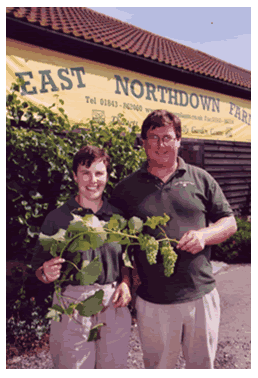THERE’S something different about the plant nursery at East Northdown Farm (Northdown farm plant nursery map). For a start there are no massed pots of tender plants hot off a lorry from Holland here. Instead there are more resilient plants propagated from stock that has been proven to suit chalk soil, low rainfall and drying north easterly winds – conditions they face in the farm’s garden, a mere salty breeze from Margate, Kent.
“A wind is always blowing off the sea here and we have a low rainfall. We have built up a reputation for selling plants that will grow well – the sort of plants that we know do well in our own garden,” explains William Friend who runs the plant nursery with his wife Louise. Louise , a surveyor, changed her career and put her efforts into the fledgling plant nursery when the couple started a family.
William and Louise Friend the owners of East Northdown Farm Plant Nursery
The plant nursery keeps the couple busy seven days a week but they enjoy working together and find it has helped them become more integrated into the local community. “Customers like to be served by us personally and ask how the family is, and they like the fact that we grow most of the plants ourselves,” says Louise.

Louise and Will Friend Owners of East Northdown Plant Nursery
Customers can take a walk round their garden, which is not some clipped and mannered, tidy plot but a wonderful fulsome mix of plants that fills every inch of border and shows the full gamut of growth from bud to seed head.
“People wonder why everything is not dead-headed or clipped back but we want the seeds and we want to take cuttings, divide up plants and propagate things on,” explains William. “People like to look round it, especially on Sundays and we take them to see the plants. Some things are hardy here that will not be elsewhere like euryops (big shrubs with grey or green leaves) and salvias which flower from June to November. Quirky things do well here, such as grey leaved plants that will rot off in the West Country where it is just as warm but wet.”
A lot of Californian plants do well in the garden such as the Californian tree poppy – Romneya coulteri with its papery yellow-centered white flowers and the Californian fuschia. Visitors may spot fragrant myrtle, a hybrid strawberry tree – Arbutus x ‘Marina’ , several varieties of the bottle-brush plant, pineapple broom, sea kale, european fan palm, canary island date palm, Arum italicum, Russian sage, bronze fennel and yellow bay. When Farmlife called the huge purple thistle-like heads of cardoons stood tall in a border as did spires of Acanthus mollis. Peaches were ready to pick and brown figs were ripe to bursting. The Magnolia grandiflora s were sold out as the Magnolia tree outside the farm shop had ensured a run on sales, its gloriously lemon scented, exotic, white flowers set against glossy green leaves having caught the eye of passing motorists.
Most customers live locally or come from nearby coastal towns but the plant nursery gets a lot of Londoners, too, who are visiting relatives in the area. “There is a big Cypriot community in Thanet, and small groups of Neopolitans and Sicilians, who all love coming down to the farm to choose their vines and fruit trees. We sell olive trees, which won’t fruit here, and figs, apricots and peaches, which will,” explains William, “the Persians , are very fond of quinces which they cook in a traditional sweet and sour dish a bit like a ‘mousaka.’ A group of turkish ladies visit me each year to pick vine leaves .
East Northdown Farm Plant Nursery – Farmer’s weekly
“We also sell a lot of our own grown large evergreens and specimen shrubs and are famous for our cordylines and phormiums. We have a lot of retired people round here who feel they can’t wait too long for things to grow! On the other hand they won’t pay silly prices asked for Italian grown specimen plants” William and Louise are happy with their business. “We have invested a lot of time ,money and enthusiasm into our business and feel it is finally paying dividends. Plants have always been my hobby and passion and this shows through. Fellow gardeners recognize that you ‘know your stuff’ which gives us the edge over most our competition.” Says William ,who is an Oxford trained plantsman.
